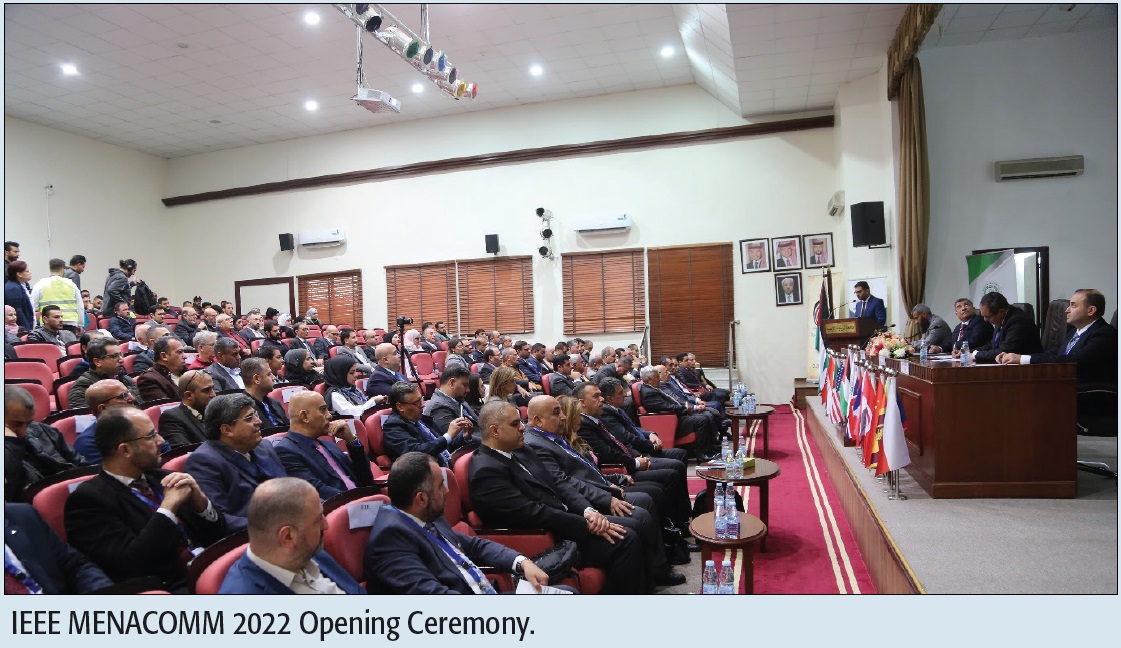
The 2022 IEEE Middle East & North Africa COMMunications Conference (MENACOMM 2022) was held on 6-8 December 2022 in Amman the capital of the Hashemite Kingdom of Jordan. IEEE MENACOMM 2022 conference is technically co-sponsored by IEEE ComSoc chapters consortium (Jordan, Bahrain, Kuwait, Lebanon, Saudi Arabia, Tunisia, Oman, Iraq, Morocco and Egypt). The conference is organized and sponsored by Al-Zaytoonah University of Jordan (ZUJ), IEEE Joint Communications and Signal Processing Society Jordan Chapter. MENACOMM 2022 is managed by a steering committee with representatives from all technical co-sponsor MENA ComSoc chapters.
IEEE MENACOMM 2022 theme will be “Advancing the Communication Vision,” in which the focus is on new technologies and trends that will shape how we preserve communication and its role in the future. The conference aims to showcase how new ideas in telecommunications, such as the use of machine learning, would transform the way such systems are designed and operated, in addition to their overreaching effect on various applications such as virtual and augmented realities, machine-to-machine communication, the internet of things and everything and much more. As such, a new track was introduced titled “Machine Learning and Optimization for Wireless Systems” in order to allow the dissemination of research related to machine learning in modern communication systems.
As a specialised young conference, the IEEE MENACOM 2022 was successful in attracting 85 paper submissions from 21 countries in only two months call-for-paper time window. Notably, the newly introduced machine learning track received almost as many papers as conventional tracks, such as physical layer related track. Every paper was peer-reviewed by experts in the field. All accepted papers will be submitted for publication in IEEE Xplore and will be indexed in Scopus.
The conference was under the patronage of his excellency Dr. Abdullah Alnsour the chair of the board of the trustees of the Al-Zaytoonah University of Jordan. The opening ceremony was chaired by the Prof. Mohammed Al-Majali, the University president and the honorary conference chair. Then the conference chair and the IEEE ComSoc &SPS chapter Dr. Sami Aldalahmeh welcomed the guests and speakers. Dr. Ala’a Khalifa, the IEEE Jordan Section chair, talked about the current state of the section. Finally, Prof. Jacques Demerjian the conference’s steering committee chair briefed the audience about the MENACOMM state of affairs.
We are fortunate to host high-calibre researchers as our keynote speakers. The first keynote speech was given by Prof. Raed Mesleh, the inventor of spatial modulation, which was titled “Internet of Things (IoT): Driving the Next Industrial Revolution.” The second keynote speech was delivered by the IEEE ComSoc distinguished lecturer Prof. Sinem Coleri titled “AI Based Ultra-Reliable Wireless Networked Control Systems in 6G.” The final keynote speech was given by Prof. Dimitri Van De Ville, which is an IEEE SPS distinguished lecturer, titled “Signal Processing on Networks: From Graphs to Brains.” The IEEE ComSoc Young Professionals (YP) also sponsored an exciting talk titled “Building Impact into Communication and Sensing Research for Young Professionals” given by Dr. Ali Zaidi from Leeds University, UK. Moreover, the Jordan IEEE YP with the cooperation with IEEE region 8 delivered a speech titled “Towards the Next-Generation Communication Systems” given by Dr. Ali Alfayly from Kuwait University and Dr. Nadine Abbas from the American University of Beirut.
As part of the conference, the MENACOMM’s guest embarked on two tourist trips, to down town Amman and to the Pink City of Petra, and one of the world’s wounders. The IEEE MENACOMM 2022 was a great opportunity for researchers and students from the MENA area and around the world to present novel research ideas, know about the new trends in communication research and it was a valuable chance for networking and collaboration among researchers and scientists.